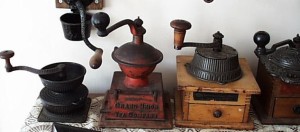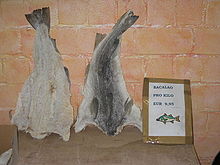
Guest post by Karen Witham

Coffee grinder
This remarkably short chapter (in my Harper Trophy 1971 paperback, it’s three pages) is all about food, or really, the lack thereof. It opens with the family eating the last of the potatoes. The cold, hunger, and lack of any normal routine is taking its toll on the family. Laura felt “numb and half-asleep;” even though she must be starving, she has no appetite for her potatoes and bread. But Pa wisely insists she eat. Ma announces cheerfully “I have a surprise for supper!” but Laura frankly writes “no one really cared.”
How I admire Ma’s strength and positive attitude now that I am a woman and a mother! As a girl reading these books I chafed sometimes at Ma’s bossiness and “uptight-ness,” but when I think of what I call “stressful” on any given day compared to what she faced I am truly humbled.
“Everything was very slow.” We get a sense of the normally bustling family stilled by fatigue and hunger and repetition.
Just out of curiosity, I Googled “signs of malnutrition” and got the following from livestrong.com:
“…The most common symptoms of malnutrition include significant weight loss, fatigue and dizziness…Swollen and/or bleeding gums are the first oral symptoms of malnutrition…Fragile bones, osteoporosis and muscle loss and/or weakness are symptoms of malnutrition…Malnutrition can cause a slowed reaction time…As malnutrition ravages the body, the organs may begin to function less efficiently. This can lead to heart problems, decreased liver function, kidney failure, decreased lung capacity, intestinal problems, stomach irregularities and abnormal menstrual cycles in females…”

Salted Codfish
I think someone else on the site has pointed out that this long winter may well have contributed to health problems later in life for Carrie, Grace, and Pa, and also Almanzo.
Trapped in a tiny room together, hungry, cold, and afraid, the world momentarily becomes a brighter place when Ma miraculously produces a frozen salted cod. “By George, Caroline, nothing can beat the Scotch!” exclaims Pa, in a rare allusion to Ma’s heritage.This brief ray of sunshine is soon ended, as the endlessly grinding mill goes on (what would they have done without the coffee mill?!) and Laura comments that Carrie is thin, white and exhausted and she is worried about her. The winds whirl and shriek at the lonely houses, whirling as the coffee mill goes ’round and ’round, “whirling forever over the endless prairie.”


Comments7
Thank you for the photos, they are things I was wondering about.
I haven’t been in a blizzard, so the whirling was interesting. Is that what it does, in a circle motion sometimes?
Is anyone else wondering where she got the cod, and why haven’t they eaten it before? If the whole town is eating ground wheat, I’m sure there wasn’t cod at the store.
I can’t imagine how depressing the whole winter must have been for everyone. Why wake up in the morning? There’s going to be no change from the day before.
I have started doing a similar thing with my kids. Even though I know I don’t need something, if I am doing an order for food, I will sometimes put in an extra thing for emergencies. Usually it comes in very handy. And yes, I hide food.
@Lauri: that question is explained in the book. Ma had the cod hidden out in the entryway, where Pa and Laura performed their endless hay-twisting duties. She was saving it for a surprise.
I’ve thought on that passage some. In one sense, you have to wonder why they didn’t eat it sooner. Why not eat it straight off, when everything else ran out? But on the other hand, Ma knew it would get eaten at some point, so did it really matter if it was eaten first or later? Probably not. But it did matter, in that the cod creates a welcome break in the routine, and a much-welcome variation in their meals. It’s a brief bright spot in the long, dark winter. Ma surely had that in mind when she hid it away to begin with, and to me, shows that Ma was as aware of the need for psychological nourishment as she was for physical nourishment, and did what she could with the little she had in order to create that moment.
It’s true, one cannot help but read those books and come away with an enormous respect for Caroline Ingalls.
I tend to think that someone stopped by on an errand and gave it to Ma. I think perhaps she was saving the surprise for Pa, not the girls (as in, the girls knew about it Pa didn’t, or the girls knew about it and she had saved it so long they had forgotten it). But its hard to say. I doubt seriously that it had been there since, for example, Christmas.
I also think malnutrition was why Laura never grew taller than 4’9 and had some pregnancy issues. If her bone structure didn’t form properly, you can bet she did have some cephalopelvic disproportion during childbirth (someone mentioned possible reasons for bringing in the doctor in TFFY when only midwives were common then.) Most children born and reared on the frontier, from what I’ve read, didn’t get very big, and life expectancy was only 40. Laura, ‘Manzo and Rose probably fared better on that score because they left.
People were, on average, shorter 100+ years ago than they are today. But even for the time in which she lived, Laura was shorter than average. (Did the hard winter coming just about the time she was likely to have hit her puberty growth spurt make difference? Possibly. )
One problem she probably didn’t have was rickets — all that running around without a sunbonnet, in dresses that made her legs look like snipe-legs had the advantage of providing plenty of sunshine on her skin.
Also, life expectancy was actually higher for people living in rural areas than in the city. Infant mortality rates were significantly lower, epidemic diseases less easily spread, hygiene much better, and people were likely to be a bit better nourished. (And Americans were generally better fed/healthier than Europeans, because food was more available and cheaper.)
Comments are closed.